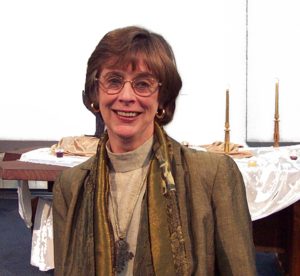Twenty-Third Sunday after Pentecost (Proper 25), 28 October 2018
October 28, 2018 | by Marjorie Suchocki
| Reading 1 | Reading 2 | Reading 3 | Reading 4 | Reading 1 Alt | Reading 2 Alt |
|---|---|---|---|---|---|
| Job 42:1-6 (10-17) | [Psalm 34:1-8 (19-22)] | [Hebrews 7:23-28] | [Mark 10:46-52] |
Job: Faith in Tough Times
Job 42:1-6 (10-17)
NOTE: If you choose to preach from Job, It is essential that you first re-read the entire book. Each lectionary text requires its full context .
The thirty-eighth chapter of Job begins the long section culminating with chapter 41. Throughout these chapters the mysteries of creation are called as witness to the vastness and wonder of the God of creation.
And finally, there is space for Job to speak in direct response to God. Earlier, in chapter 29, Job had recounted his previous life, both its integrity and its blessings. In chapter 30 he bewailed his fallen estate, not only his physical pain, but the loss of honor and respect from those who once praised him for his uprightness. In Job 31, he protests his innocence to God, and cries out for God to answer him. And now in fact God does answer him, not with reasons, but with a revelation of God’s creative power, of things so mighty and inexplicable that they dwarf Job’s concerns, and pour scorn on the so-called “wisdom” of his comforters. Job’s response to the voice from the whirlwind is contrite and trusting: “Therefore I have declared that which I did not understand, things too wonderful for me, which I did not know. I will ask Thee, and do Thou instruct me. I have heard of Thee by the hearing of the ear, but now my eye sees thee. Therefore I retract, and I repent in dust and ashes” (42:3b, 4b-6).
But we do not hear any vocal response from Job’s three comforters, his friends. Instead, the Lord instructs them to offer a sacrifice of repentance, and tells Job to pray for them, and God will accept their burnt offering. The three ill-spoken friends then do as God has bid, “and the Lord accepted Job” (42:9).
Many scholars consider that this is the official ending of Job, and that the verses from 10 through 17 (of Job 42) are later additions. Indeed, there are strong theological reasons for appreciating such scholarly opinion, for the whole point of the book has been to undercut the theory that only good things happen to good people. The book of Job contradicts the dominant theory that righteousness is rewarded with temporal blessings, along with its invidious reversal that temporal blessings are a witness to one’s righteousness! To the contrary, to be human is to be finite and therefore fragile; we are subject to many kinds of sickness, one of which will be a sickness unto death, hopefully (but not necessarily!) in old age. The blessing of faith is not worldly goods and freedom from sickness and death; the blessing of faith is the power of endurance no matter what, trusting the unfailing presence of the omnipresent creator God. The blessing of faith is courage; the blessing of faith is the deep down knowledge of Job 19:25, “I know that my Redeemer lives!”
If we include those final verses (42:10-17) as part of what we should learn through the whole book of Job, then we undercut the whole lesson of the previous 41 chapters. In those last verses, Job is rewarded for enduring his turmoil; he has passed the ultimate cosmic test, and now the correct order is restored: righteousness is rewarded with material prosperity, great wealth, good health, and one hundred and forty more years of life! If we accept this and reject the message of Job, we would have to ask with the disciples of John 9, “who sinned, this man or his parents, that he was born blind?” Jesus refused the supposition of such a question, and perhaps we too should refuse the supposition of the final verses of Job (42:10-17). Faith, accepting our finitude and our fragility, proclaims instead, “I know that my Redeemer lives,” and dares to live a life of integrity, a life of love. No matter what!
Marjorie Hewitt Suchocki is Professor Emerita, Claremont School of Theology, Faculty Co-Director Emerita of the Center for Process Studies, Director Emerita of Process and Faith, and the founder and former Director of the Common Good International Film Festival (formerly, Whitehead International Film Festival). Among her many books are God Christ Church: A Practical Guide to Process Theology; The End of Evil: Process Eschatology in Historical Context; The Whispered Word: A Theology for Preaching; In God’s Presence: Theological Reflections on Prayer; and Through a Lens Darkly: Tracing Redemption in Film.

